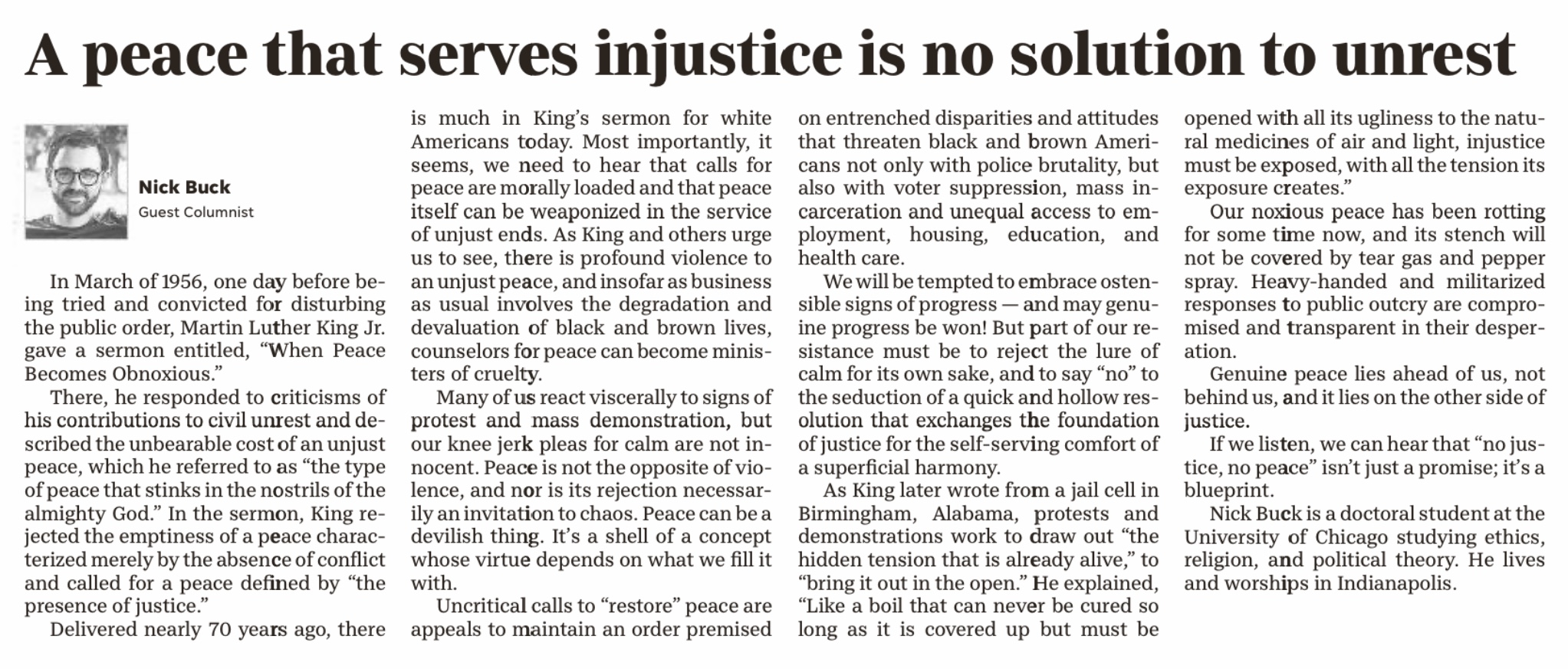“A peace that serves injustice is no solution”
Published in the “Faith & Values” section of The Indianapolis Star on June 7, 2020
FULL TEXT:
In March of 1956, one day before being tried and convicted for disturbing the public order, Martin Luther King Jr. gave a sermon entitled, “When Peace Becomes Obnoxious.”
There, he responded to criticisms of his contributions to civil unrest and described the unbearable cost of an unjust peace, which he referred to as “the type of peace that stinks in the nostrils of the almighty God.” In the sermon, King rejected the emptiness of a peace characterized merely by the absence of conflict and called for a peace defined by “the presence of justice.”
Delivered nearly 70 years ago, there is much in King’s sermon for white Americans today. Most importantly, it seems, we need to hear that calls for peace are morally loaded and that peace itself can be weaponized in the service of unjust ends. As King and others urge us to see, there is profound violence to an unjust peace, and insofar as business as usual involves the degradation of black and brown lives, counselors for peace can become ministers of cruelty.
Many of us react viscerally to signs of protest and mass demonstration, but our knee jerk pleas for calm are not innocent. Peace is not the opposite of violence, and nor is its rejection necessarily an invitation to chaos. Peace can be a devilish thing. It’s a shell of a concept whose virtue depends on what we fill it with.
Uncritical calls to “restore” peace are appeals to maintain an order premised on entrenched disparities and attitudes that threaten black and brown Americans not only with police brutality, but also with voter suppression, mass incarceration and unequal access to employment, housing, education, and healthcare.
We will be tempted to embrace ostensible signs of progress — and may genuine progress be won! But part of our resistance must be to reject the lure of calm for its own sake, and to say “no” to the seduction of a quick and hollow resolution that exchanges the foundation of justice for the self-serving comfort of a superficial harmony.
As King later wrote from a jail cell in Birmingham, Alabama, protests and demonstrations work to draw out “the hidden tension that is already alive,” to “bring it out in the open.” He explained, “Like a boil that can never be cured so long as it is covered up but must be opened with all its ugliness to the natural medicines of air and light, injustice must be exposed, with all the tensions its exposure creates.”
Our noxious peace has been rotting for some time now, and its stench will not be covered by tear gas and pepper spray. Heavy-handed and militarized responses to public outcry are compromised and transparent in their desperation.
Genuine peace lies ahead of us, not behind us, and it lies on the other side of justice.
If we listen, we can hear that “no justice, no peace” isn’t just a promise; it’s a blueprint.
